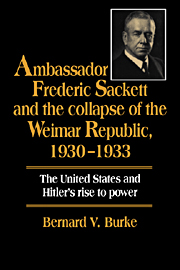Book contents
- Frontmatter
- Contents
- Acknowledgments
- Abbreviations used in the notes
- Introduction
- 1 A time of opportunity
- 2 American diplomacy, official and unofficial
- 3 The landslide election
- 4 Sackett takes the initiative
- 5 Sackett and the financial crisis
- 6 Perceptions of Nazism and communism, with an afterthought on fascism
- 7 One end, two paths: Brüning and Hitler in conflict
- 8 Efforts to sustain representative government in Germany
- 9 Sackett loses heart with Brüning's fall
- 10 The decline of Hitler and the Nazis
- 11 Through a glass darkly
- Conclusion
- Bibliography
- Index
Introduction
Published online by Cambridge University Press: 30 September 2009
- Frontmatter
- Contents
- Acknowledgments
- Abbreviations used in the notes
- Introduction
- 1 A time of opportunity
- 2 American diplomacy, official and unofficial
- 3 The landslide election
- 4 Sackett takes the initiative
- 5 Sackett and the financial crisis
- 6 Perceptions of Nazism and communism, with an afterthought on fascism
- 7 One end, two paths: Brüning and Hitler in conflict
- 8 Efforts to sustain representative government in Germany
- 9 Sackett loses heart with Brüning's fall
- 10 The decline of Hitler and the Nazis
- 11 Through a glass darkly
- Conclusion
- Bibliography
- Index
Summary
The purpose of this study is to tell the story of how a lawyer, businessman, and United States senator from Kentucky, who was appointed as American ambassador to Germany, reacted to the collapse of the Weimar Republic and to Hitler's rise to power. Thrust into the center of activity in Berlin because he understood business and finance, and because he was almost certain to be defeated in his campaign for reelection to the United States Senate, Frederic M. Sackett, Jr., played a meaningful role in momentous events. He was a central figure in American attempts to save republicanism in Germany, and to thwart Hitler's rise to power. His mission is inherently fascinating because it involved the American response to the rise to power of one of the most significant figures in twentieth-century history. It is also important because Sackett represents an outstanding example of a diplomat who became exceptionally dedicated to advancing the policy of the nation to which he was accredited. Throughout his tenure in Berlin, he followed American foreign policy, but he did so by favoring German foreign policy goals, and especially those of Chancellor Heinrich Brüning.
Sackett, of course, did not act alone. The American response to events in Germany involved numerous statesmen and diplomats as well as financiers and bankers. The American embassy in Berlin, headed by Sackett, was ably served by professional diplomats, among whom the most important were Foreign Service officers George Gordon, John Wiley, and George Messersmith. In Washington, President Herbert Hoover played a prominent role, as did Secretary of State Henry Stimson, Undersecretaries Joseph Cotton and William Castle, and a host of diplomats in the State Department.
- Type
- Chapter
- Information
- Publisher: Cambridge University PressPrint publication year: 1995



